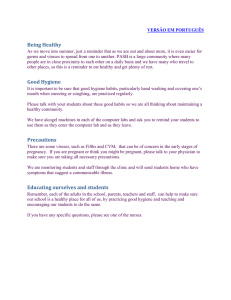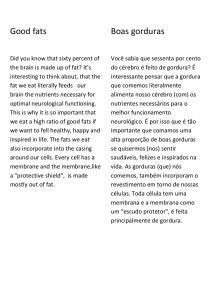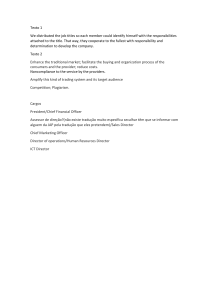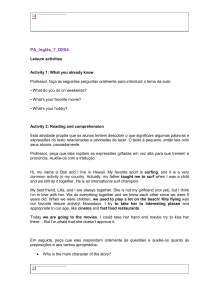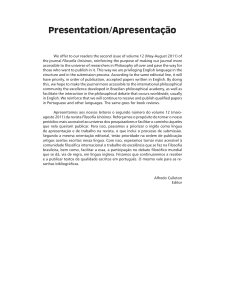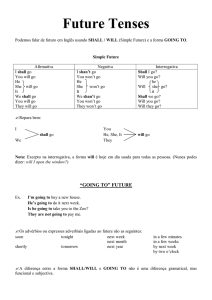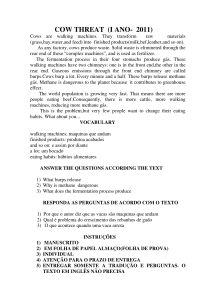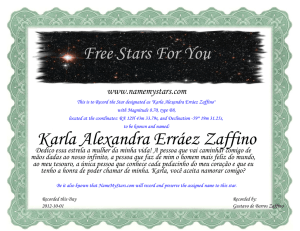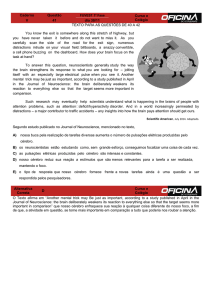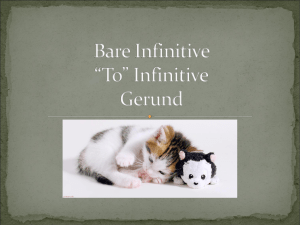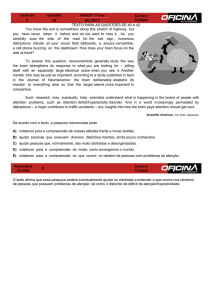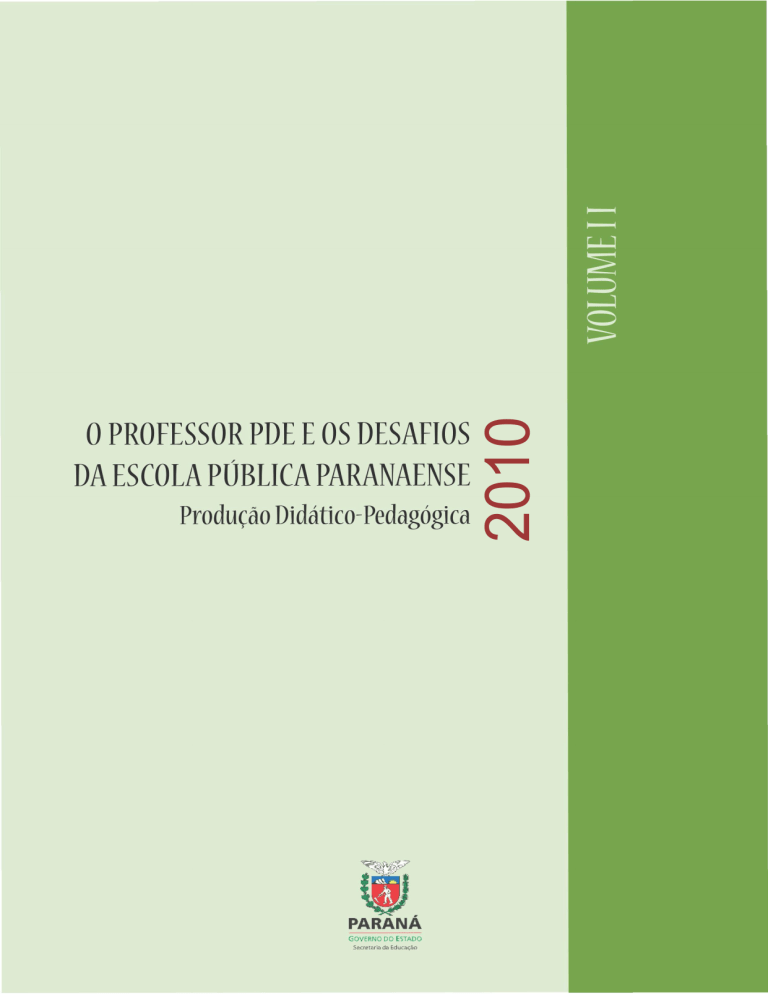
Ficha Catalográfica Produção Didático - Pedagógica
Professor PDE/2010
Título
A INTERCULTURALIDADE NO ENSINO DE LÍNGUA
INGLESA ATRAVÉS DA MÚSICA
Autor
Guilherme Kaminski
Escola de Atuação
Escola Estadual Nova Sant‟Ana
Município da escola
São Jorge D‟Oeste
Núcleo Regional de Educação
Dois vizinhos
Orientador
Larissa Giordani Schmitt
Instituição de Ensino Superior
UNIOESTE
Área do Conhecimento
Língua Estrangeira Moderna
Produção Didático-Pedagógica
Unidade Didática
Relação Interdisciplinar
Público Alvo
Alunos da oitava série - Ensino Fundamental
Localização
ESCOLA ESTADUAL NOVA SANT‟ANA
SÃO JORGE D‟OESTE - PR
Apresentação
Palavras-chave
Através das letras de canções de autores oriundos de
diferentes países, pretende-se despertar o interesse
dos alunos pela aprendizagem de uma língua que já
se tornou internacional: o Inglês. Uma vez que a
maioria das pessoas aprecia algum ritmo musical,
acreditamos que este pode ser o ponto de partida para
ampliar o conhecimento de outras culturas que através
de suas canções procuram expressar seus
sentimentos, que acabam sendo muito similares aos
dos estudantes.
O objetivo principal é a aprendizagem numa
perspectiva crítica, para que não haja a valorização
exagerada da cultura dos países de falantes nativos de
Inglês, motivo pelo qual são apresentadas músicas de
diversos países.
São sugeridas atividades das mais diversas, desde a
ampliação de vocabulário à análise linguística das
letras. Também há indicações de pesquisas que
possam ampliar o horizonte cultural dos alunos.
Interculturalidade; Músicas; Inglês.
Ao professor
Caro(a) colega, com o intuito de colaborar para a implementação de suas
aulas, elaboramos este material cujo conteúdo está voltado à abordagem crítica,
numa perspectiva intercultural através da música.
Optamos por esta temática baseados nas Diretrizes Curriculares do Estado
do Paraná para Língua Estrangeira Moderna (2008) que estipulam:
“A aula de LEM deve ser um espaço em que se desenvolvam atividades
significativas, as quais explorem diferentes recursos e fontes, a fim de que o
aluno vincule o que é estudado com o que o cerca” (DCE, 2008, p. 64).
Para chegar ao entendimento da importância de dominar uma língua franca
como o Inglês no mundo de hoje, o aluno precisa antes de tudo entrar em contato
com os diversos tipos de texto a que são submetidos nesta língua, como: rótulos,
filmes, mensagens e músicas. Escolhemos este tema por considerarmos que de
alguma maneira todas as pessoas sentem-se tocadas pela linguagem musical.
Segundo Griffee (1992, p.4), “as canções nos falam diretamente sobre nossas
experiências, nos reanimam nos momentos de sofrimento”. Acreditamos que este
pode ser o ponto de partida para despertar nos jovens o interesse pela língua
inglesa, com o intuito de utilizá-la para se comunicar. Freire (1996) sugere relacionar
o meio em que os alunos vivem com o conhecimento que já trazem consigo. Se lhes
for permitido que mesmo com limitações consigam falar de si na língua estrangeira,
poderão no contato com as músicas ampliar seu universo de conhecimentos.
Certamente todo professor de língua estrangeira, em algum momento, já
trabalhou com letras de música em suas aulas, de maneira que não trazemos
nenhuma atividade inédita. O que queremos enfatizar no nosso projeto é, entretanto,
o contato com as diferentes culturas que existem em nosso planeta, nesse caso,
através do gênero música.
Queremos evitar a valorização exagerada da cultura dos países de falantes
nativos do inglês, os quais através do ensino desta língua procuram impor sua
cultura e hábitos aos demais países, principalmente do hemisfério sul. Galeano
(2006) nos chama a atenção para esta tentativa de dominação, à qual precisamos
estar atentos.
Escolhemos letras de canções de países diversos, como: Coréia do Sul,
Jamaica, Gana, Austrália, Alemanha, Brasil, Estados Unidos e Inglaterra. Os ritmos
também são variados a fim de atender diferentes gostos musicais. Acreditamos que,
a partir das músicas, o aluno possa perceber a riqueza da diversidade cultural
existente em cada cultura e utilizar o inglês como um instrumento de comunicação
internacional, percebendo inclusive as diferentes pronúncias existentes em cada
país.
As canções são apenas o estímulo para iniciar uma grande viagem a outros
países, diferentes culturas e que através das letras expressam o que sentem e
pensam. É muito provável que nossos jovens alunos consigam identificar-se com
alguma delas e passar a ver o aprendizado de inglês com mais interesse.
As atividades aqui propostas procuram desenvolver o vocabulário, a
pronúncia, a estrutura linguística e o conhecimento de mundo do educando.
As
sugestões dessas atividades não se esgotam aqui, cabe ao professor a opção de
ampliá-las de acordo com o conteúdo que estiver trabalhando. A avaliação pode ser
realizada em forma de participação das atividades, testes ou trabalhos em grupo.
Os textos suplementares são de nossa autoria, baseados nas pesquisas que
realizamos. Uma boa viagem musical.
CHAPTER ONE
A primeira canção a ser trabalhada é “Dust in the Wind” gravada pelo grupo
Scorpions.
Eis um trecho:
I close my eyes
Only for a moment,
And the moment's gone.
All my dreams,
Pass before my eyes, a curiosity.
Dust in the wind,
All they are is dust in the wind.
…
And all your money
Won't another minute buy.
Dust in the wind,
All we are is dust in the wind.
Dust in the wind,
All we are is dust in the wind.
…
Letra
completa
e
o
vídeo
disponíveis
no
endereço
eletrônico:
http://letras.terra.com.br/scorpions/81072/
VOCABULARY ACTIVITIES
Antes de passar a música ou a letra para os alunos, escolha palavras do
vocabulário e encontre imagens relacionadas às mesmas na internet, salve e passe
na TV pen drive. Também é possível trazer as palavras recortadas com figuras ou
desenhos.
Exemplos de palavras desta canção:
EYES
DROP OF WATER
WIND
SKY
SEA
DUST
EARTH
Observação: os sites das imagens acima estão relacionados nas referências
bibliográficas.
Professor(a): Este é um momento de fixação das palavras e uma
oportunidade de conversar em inglês com os alunos, ao apresentar cada palavra e
imagem solicite que tentem relacioná-las com outras que já conhecem.
Exemplo:
The Earth is our planet.
What color are your eyes?
Have you ever seen the sea?
The wind blows and the dust rises up.
Após a apresentação do vocabulário, passar a música. Conforme forem
ouvindo a música, pode-se estabelecer uma disputa entre os alunos para ver quem
reconhece mais palavras vistas anteriormente.
Activities
1) This song has a beautiful message. Choose the best option.
( ) The dust is very awful for us.
( ) We need to clean the dust in our houses and close the windows because
of the wind.
( ) All that we see will finish some day.
(
) We have to close our eyes.
2) Find the part of the song that best expresses this message.
READING
INTERNATIONAL SINGERS
Did you know that not only the United States and England speak English?
English is spoken in many countries around the world, in some as the first language,
in others as the second or an international language. There are about 2 billion people
in the planet that speak English today.
So, if you meet a Russian or a Japanese, you can communicate with them in
English. And the songs in English are appreciated in all countries. That‟s why we will
know some singers or musical groups from different places and continents that sing
in English. The group Scorpions, for example, is from Germany. There are many
good music groups in Europe, Asia, Africa, Oceania and America singing in the same
language what the human being feels.
ANSWER:
1) What do you know about Germany? What language do they speak there?
2) Do you know someone that speaks German? Who is he/she?
3) Do people from your country speak English too? Do they study it at school?
4) Have you ever heard a song from Scorpions? Mention it.
5) What‟s your favorite band or singer? Is he/she Brazilian or from another country?
(Pode-se falar sobre algumas bandas e alguns cantores que os alunos
conheçam. Também sondar sobre os seus ritmos preferidos).
What kind of music do you prefer?
Rock
-
pop music
-
country
-
reggae -
samba
Rap
-
romantic
-
jazz
-
classic -
others
-
CHAPTER 2
Você, como todo mundo, certamente já passou por momentos bons e
também por horas em que dá vontade de chutar o balde, não é verdade?
Vamos conhecer uma música dos Beatles a respeito do assunto?
Let It Be (fragmento)
The Beatles
Composição: John Lennon e Paul McCartney
Figura01: Os Beatles
Fonte: www.portaldoprofessor.mec.gov.br
When I find myself in times of trouble
Mother Mary comes to me
Speaking words of wisdom:
Let it be
And in my hour of darkness
She is standing right in front of me
Speaking words of wisdom:
Let it be
Chorus:
Let it be, let it be
Let it be, let it be
Whisper words of wisdom:
Let it be
…
Letra e música completa disponível no site www.http://letras.terra.com.br/thebeatles/95
ACTIVITIES ABOUT THE SONG
1 Escreva as expressões da música dadas abaixo nas colunas adequadas:
Bad moments in life
Good moments in life
a) When the night is cloudy.
b) When I find myself in times of trouble.
c) I wake up to the sound of music.
d) There is still a light that shines on me.
2 Responda:
1) What happens to the singer when he is unhappy?
(Mother Mary goes to him.)
2) What's the meaning of the word "darkness" (line 6)?
(Moments of despair in life.)
3) Which of the alternatives below best describes the main idea of the song?
( )Life is very hard.
( )Problems can be solved.
( )There is a chance for broken hearted people.
( )People are always in trouble.
4) In your opinion, what does the singer mean by "words of wisdom"?
(These "words of wisdom" can be the answers to the problems the singer faces in
life. He probably says a pray or has faith in God and then he is blessed).
5) Who is "Mother Mary"?
(She's Jesus Christ's Mother, or the singer‟s mother.)
SUGESTÃO DE PESQUISA
Pode-se solicitar aos alunos para fazerem uma pesquisa sobre a Banda
Beatles. Certamente encontrarão muitos materiais a respeito, tanto em enciclopédias
como na internet, uma vez que foi o grupo musical que provavelmente mais sucesso
alcançou mundialmente até hoje.
Algumas perguntas para encaminhar o trabalho:
Where are the Beatles from?
Do you know the name of their components? Are all them still alive today?
When did they begin their success? And when did they finish the group?
List some of their most successful songs.
Para a apresentação os alunos poderão confeccionar cartazes para serem
expostos na sala ou no mural da escola. Essas informações devem ser divididas
com os demais colegas.
CHAPTER THREE
And now: How about a jazz from the most famous Jamaican singer, Bob Marley?
Figura02: Bob Marley
Fonte: www.audiolibrogratis.com
Three Little Birds (fragmento)
Bob Marley
Composição: Bob Marley
Don't worry about a thing
'Cause every little thing
Gonna be all right
Saying, don't worry about a thing
'Cause every little thing
Gonna be all right
Rise up this morning
Smile with the rising sun
Three little birds
It's by my doorstep
Singing sweet songs
Of melodies pure and true
Sayin', "This is my message to you"
Singing don't worry about a thing,
Worry about a thing,
Every little thing gonna be all right
Don't worry!
Singing don't worry about a thing"
I won't worry!
'Cause every little thing
Gonna be all right
…
Letra e música completa disponível no site www.http://letras.terra.com.br/bobmarley/24579/
VOCABULARY ACTIVITIES
1) Depois de ouvir a música, pedir aos alunos que numerem as palavras na ordem
em que forem ouvindo. Tocar a música novamente para que façam a atividade:
( 3 ) all right
( 6 ) birds
( 7 ) doorstep
( 9 ) melodies
( 4 ) smile
( 8 ) songs
( 5 ) sun
( 2 ) thing
(10) true
( 1 ) worry
2) Fill in the missing words from the song.
________ worry about a thing,
_________every little thing _________be all right.
Rise up this ___________
Smiled with the __________ sun,
___________ sweet songs
____________"This is my message to ______________”
Match the left and right sides to complete the sentence or phrase from the song.
Draw a line to connect them.
Rise up
Three little
Singing
Of melodies
Beside
Smile with
Singing “This is
‟Cause every little thing
Don‟t worry
the rising sum
is going to be all right
pure and true
about a thing
sweet songs
my doorstep
this morning
my message to you.“
birds
CONVERSATION
Is the message from this song negative or positive? Find an excerpt in the
lyrics that comproves your choice.
Do you worry about the problems or you are like the person of the song?
Conheça um pouco da Jamaica, sua cultura, suas belezas. Pesquise na
internet.
TEXTO SUPLEMENTAR
People Know You Are Jamaican If... (adaptado)
People know you are Jamaican if...
1.
You can distinguish between "cocoa-tea" "bush-tea" and "green-tea".
2.
When someone sympathizes with you, you comment "Yuh tink seh it easy?"
3.
You point with your lips.
4.
You can't say "three" or "thing" ... you say "tree" and "ting".
5.
You say words like Heg (instead of Egg); Hingland (instead of England).
6.
You give directions with your hands, even if it is in another state.
7.
You go to parties for the food and drink and then cuss afterwards when the
food and drink run out.
8.
You nod your head upwards to greet someone.
9.
You always find yourself standing next to plenty of luggage and boxes at the
airport.
10.
When you travel home, you bring an extra suitcase going down, it has none of
your clothes; returning, it has food.
11.
You also point to other people picking their nose.
12.
You hate to throw away empty containers as they might come in handy for
pepper sauce or "green seasonings".
13.
You have one big pot you call curry pot when you are not even cooking curry.
14.
You have another pot you called dutch pot.
15.
You say "boy" at the beginning of a sentence and "man" at the end of it.
16.
You always hang something on your rearview mirror.
17.
You put pepper sauce on everything for the taste.
18.
You think eating ackee and saltfish, plaintain and fried dumplings is a great
morning breakfast.
19.
You can't go a week without a rice dish.
20.
You think steak is a waste of good meat; you would rather cut it up and stew it
with potatoes.
21.
You chew and suck out all the marrow from the chicken bone and then pick
out your teeth afterwards.
22.
You save all juices from the cooked meats/chicken to use for flavour for your
next dish.
23.
You wash and rinse plastic utensils and cups that can be used again.
24.
You bring home food from a party (enough for your breakfast the next
morning, your lunch and your dinner!)
25.
You chew the ice when you finish your drinks.
Fonte: http://www.jamaicans.com/culture/articles_culture/people-know-you-are-jamais.html
Após ler o texto, responda as questões e depois compartilharemos as ideias
Sabemos que cada povo possui algumas características próprias devido à
cultura em que está inserido. Os ingleses têm as suas, os brasileiros, mexicanos,
japoneses...
1) Qual característica do jamaicano chamou mais a sua atenção?
2) O que o jamaicano tem em comum com os brasileiros?
3) Como você acha que os estrangeiros vêem os brasileiros?
GRAMMAR
Relacione os verbos com suas definições:
(1) to save
( ) to place in a specific location, set
(2) to chew
( ) to bite and grind with the teeth, masticate
(3) to point
( ) to lower and raise the head quickly
(4) to put
( ) to indicate, reveal or suggest
(5) to nod
( ) to keep in a safe condition, safeguard
CHAPTER FOUR
Now, we will go to the USA. Have you ever heard about Elvis Presley, the
one that was considered the King of Rock? Here, one of his most beautiful songs.
Figura03: Elvis Presley
Fonte: www.portaldoprofessor.mec.gov.br
In the Ghetto
Elvis Presley
Composição: Elvis Presley
Letra e música
presley/31398/
completa
disponível
no
site:
http://letras.terra.com.br/elvis-
PRE-READING ACTIVITIES
Recortar as linhas da canção e distribuir para os alunos. A atividade pode
ser individual ou em grupo. Tocar a música e pedir aos alunos que a completem na
ordem correta.
A child needs your helping hand;
--------------------------A poor little baby child is born
---------------------------Ah, people don‟t you understand
---------------------------And as a young man dies on a cold and grey, Chicago morning,
---------------------------And he learns how to steal and he learns how to fight
----------------------------
And his hunger burns, so he starts to roam the streets at night
---------------------------And his mama cries
---------------------------And his mama cries „cause if there‟s one thing she doesn‟t need
--------------------------And look the other way?
---------------------------Another little baby child is born
---------------------------Are we too blind to see?
- - - - - - - - - - - - - - - - - - - - - - -- - He buys a gun and steals a car;
----------------------------
He tries to run but he doesn‟t get far,
----------------------------
He‟s going to be an angry young man some day
---------------------------In the ghetto
----------------------------
GRAMMAR ACTIVITIES
1 – Complete com adjetivos do texto:
As the snow flies
On a .............. and .............. Chicago morning
A ............. ............. ............. child is born
in the ghetto.
And his mama cries
„Cause if there‟s one thing she doesn‟t need
It‟s another .............. mouth to feed
In the ghetto.
Ah, people don‟t you understand
A child needs your ............. hand;
He‟s going to be an .............. young man some day
Oh, take a look at you and me,
Are we too............ to see?
2 - É possível também explorar os verbos na forma afirmativa, negativa, e
interrogativa neste texto.
Ex: He buys (3ª pessoa singular) – note que leva um “s”.
A - Encontre outros exemplos de verbos na 3ª pessoa do singular no Simple
Present Tense.
B - Encontrar frases na forma negativa ou interrogativa.
Ex: (People don‟t you understand - negativa)
(Do we simple turn…- interrogativa)
READING
WHAT DO YOU KNOW ABOUT USA?
When we think about the United States, we imagine a rich country. And it
really is one of the richest nations in the world.
But there are many poor people there, too. Chicago is known, through the
movies we see, for its lights and luxurious casinos. This song shows us the other
side of this city: the ghetto, a place with a lot of violence because of its poverty.
Oral activities:
1) What places in Brazil are similar to the ghettos?
2) What states or cities from the United States do you remember the names?
3) Do you know other songs from Elvis Presley? What about his history?
CHAPTER FIVE
Figura04: Mapa Coréia do Sul
Fonte: www.wikipedia.org
Do you know Korean singers? Here we have a beautiful song in the English
version.
WEDDING DRESS (Trecho)
Taeyang
Composição: Taeyang
Some say it ain't over till it's over
But I guess it's really over now
There's something I gotta say before I let you go
Listen...
Can't believe what's goin' on
Gotta keep my cool, be calm
When I heard you and he was screamin' out of control
All I can think about is "No, no, no... he won't
hurt the one I've cared for so long, long... Hell, no."
I know we're done, and now it's none of my concern but how
can two be windin' out from only weeks in goin' out
Just makes me feel that what we had was real
Could it be or is it too late? (Oh, oh baby)
***chorus 1
Baby!
Listen to your heart, won't let you down
Cause you should be my Lady!
Now that we're apart love will show how
Life carries on...
I've never felt so strong
Life can lead us to a happiness never ending
If we just know that we belong to each other
Never worry, grow as we go
See you in your wedding dress
I can see you in your wedding dress
I see you walking down in your ... (wedding dress)
I can see you in your wedding dress (Oh, yea~)
…
Letra e música completa disponível no endereço eletrônico:
http://www.youtube.com/watch?v=RtRsDYpCS3Q
Dong Youngbae, better known by his stage name Taeyang (Hangul: 태양,
Hanja: 太陽, meaning Solar) or SOL, is a South Korean recording artist, entertainer.
After appearing in Jinusean's music video "A-yo", Taeyang began training under YG
Entertainment at the age of 12 alongside fellow member and leader G-Dragon. After
six years of vocal and dance training he made his debut in 2006 as a member of Big
Bang. (WIKIPEDIA-Adapted)
Professor (a) : Antes de passar a música, comentar sobre a Coreia do Sul
(sua localização, história da separação com Coreia do Norte, etc).
O texto acima retirado da Wikipédia ajuda a apresentar o cantor Taeyang.
Lembrar que esta música é uma versão, cuja letra original em coreano também pode
ser encontrada no site www.youtube.com.
Answer:
1) Who is Taeyang? What‟s the meaning of his name?
2) How old was he when he began his training?
3) Where is South Korea located? What language do they speak there?
VOCABULARY ACTIVITIES
Escolha palavras ou frases da letra da música e escreva em cartões
recortados previamente.
Espalhe os cartões sobre a mesa e toque a música. Quando os alunos
ouvirem e reconhecerem a palavra ou frase deverão bater no cartão e recolher o
mesmo. O time ou o aluno que juntar mais cartões vencerá.
O professor pode estabelecer um prêmio ao vencedor.
GRAMMAR
1) No texto aparece um verbo chamado modal auxiliar que indica uma
capacidade física ou psicológica. (can)
Ex: I can see you in your wedding dress.
Encontre outras frases onde este verbo aparece.
a)
Na forma afirmativa-
b)
Na forma negativa-
c)
No past tense-
2) Encontre no texto 4 exemplos de uso de contrações.
CHAPTER SIX
And now, let‟s go to Australia
Figura05: Austrália
Fonte: www.pubworldmemorabilia.com
Before listening to the music, let‟s complete the blanks.
VOCABULARY
Complete os espaços que faltam da letra com as palavras: conversation –
eyes - fool – heart – explain - wall – I am – don‟t – tell - you – know
REVOLUTION (trecho)
The Veronicas
I am temperamental
Like a ----------- without a home
I am sentimental
But, you --------- know me at all
I have expectations
I wanna be the one you call
And I want a --------------------
you don‟t --------- me at all
Hold on tight
I am, I'm a revolution
Close your ---------I am, I am
I'll blow your mind
------------, I'm a revolution
Why do I have to -------------- who I am again and again?
I am
I know what your thinkin
I can ----------- what you're waitin for
But I think that you're pretending
But you don't -------------- me at all
If --------- knew me at all you'd take my picture
And you'd hang it on your------------…
Letra e música
veronicas/322630/
completa
disponível
no
site:
http://letras.terra.com.br/the-
GRAMMAR
1) Na canção aparecem alguns verbos no tempo presente. Encontre o
passado (Past Tense) dos verbos:
I amI haveI knowI thinkI can-
2) Estes verbos são regulares ou irregulares? Explique a diferença entre eles.
BINGO
Escolha nove palavras da letra da música e escreva-as nos quadrados
abaixo. O(a) professor(a) vai falando a palavra
e se você a tiver, marque-a.
Ganhará quem acertar todas primeiro. Good Luck.
Do you know how to find a profile from an artist in internet? Let‟s know about
our Australian singers.
Profile: Veronicas (Adapted)
The Veronicas are the sisters Jess and Lisa (Twins/Ninja Pixies). Both girls
have been singing and writing since they were young.
Jess has been known to date her guitar on a regular basis, but is currently
having an affair with a Bass. Plans to save the world one foot in mouth statement at a
time. Doesn't think before she inks, but its happy with that. Enjoys Koalas, does not
enjoy fascists. Empowers freedom of speech, unless it differs from her views.
Lisa started dabbling in playing Synth and experimenting in string samples recently,
until she puts her passion for wanting to learn drums into motion. Indecisive in most
things. Will popacapinyour, if you challange her integrity or her sister. Enjoys
Vinegar, does not enjoy sneaky, selfish people who only speak to hear the sound of
their own voices.
Teacher: After reading this profile, you can make some comments that the
language used here is in the colloquial English, with some Australian particularities.
Ask your students how the expressions would be in the formal English.
Fonte: www.bebo.com/Profile.jsp?MemberId=7636021279
Answer about the text:
1) What does Lisa like?
2) Who plays guitar and bass?
3) How long have they been singing?
Após a leitura e apresentação da dupla, dar aos alunos a seguinte Identify card:
---------------------------------------------------------------------------------------------------------Name:
Date of birth:
Place of birth:
Astrological birth sign:
Height:
Eye colour:
Hair colour:
Preferred music:
A favourite book:
Hobbies:
Loves:
Hates:
Hopes for the future:
-------------------------------------------------------------------------------------------------------
Depois que todos os alunos tiverem preenchido o seu cartão, recolher os
mesmos, misturar e redistribuir entre os alunos. Cada aluno apresenta para a turma
aquele cujo cartão pegou. Pode inclusive fazer mais perguntas, se desejar.
Aqui, também é interessante conversar sobre a Austrália, ver algumas
imagens daquele país e comentar sobre suas bandas conhecidas: Bee Gees,
Silverchair, etc.
CHAPTER SEVEN
Next stop: Ghana, Africa.
Figura06: África
Fonte: www.wikipedia.org
We‟re going to know two brothers that make a lot of success in Africa with
their songs: The Bradez
SIMPLE (fragmento)
Bradez
It‟s a hit man!
Make I dey feel it!
You know the name right?
Hook - KUNTA KINTE
Babe you dey be me too much
Smile make I see your dimple
Pretty girl I‟m loving your touch
Bad girls me I no dey mingle
I‟ll never ever say u bye bye
Never ever leave you single
Anytime I dey by your side
You make me feel so simple
Chorus (2x)
Simple, my baby
Simple, (u dey make I dey feel it!)
You make me simple,
You treat me right,
Smile make I see your dimple
…
Letra e música completa disponíveis no site: http://www.museke.com/node/3805
VOCABULARY
Match the columns:
(A) Pretty
( ) a facial expression
(B) A hit man
(
) to bring into contact with
(C) Smile
( ) graceful, beautiful
(D) Single
(
) professional killer
(E) Touch
(
) not accompanied by others
KNOWING THE DIFFERENT ENGLISHES IN WORLD
Esta canção possui uma letra parte em inglês e parte num dialeto falado em
Gana. Mesmo o inglês é bastante característico, uma vez que a população de lá
mistura um pouco as línguas além de utilizar uma linguagem coloquial.
Vamos perceber algumas marcas desta coloquialidade?
Professor(a): Aqui é uma oportunidade para deixar os alunos descobrirem
algumas construções frasais que são diferentes da estrutura linguística formal que
foi passada a eles. Pode-se aí dar uma ajudinha e caso não consigam descobrir
sozinhos=, mostrar a eles.
You know the name right?
(A pergunta não inicia com do.)
I`ll never say u by bye.
(O uso do u, ao invés de: you).
Smile make I see your dimple. (Make I, ao invés de: makes me)
Dimple: no dicionário significa ondulação, mas o poeta refere-se às maçãs
do rosto que se movimentam quando a pessoa sorri.
Bad girls me I no dey mingle (Eu não me misturo com garotas más.)
Dey: significa várias coisas, inclusive ser ou estar. Expressão do pidgin
(inglês misturado com crioulo da Nigéria).
WHAT DO YOU KNOW ABOUT OTHER CULTURES?
Passar o vídeo com o depoimento de Chimamanda Adichie, O perigo de
uma única história. Disponível em
http://febfuerj.ning.com/video/chimamanda-
adichie-legendas-em
O depoimento é em inglês, que é bom inclusive para o aluno familiarizar-se
com a pronúncia, mas as legendas são em português. Conforme o nível dos alunos,
dá para primeiramente passar o vídeo com as legendas em inglês para depois
passar com legendas em português .
É um momento importante para quebrar certas crenças, que por falta de um
conhecimento mais amplo a respeito, todos nós podemos ter sobre os países
africanos. A partir do vídeo pode-se promover um debate, elaborar um texto,
cartazes, etc.
CHAPTER EIGHT
And what about Brazilian singers? We have a lot of good composers and
singers that are known around the world. One of the most famous is Tom Jobim that
composed “The Girl from Ipanema”. Here we‟ve chosen Waters of March because it
was considered the most beautiful Brazilian song, according to a panel of experts.
The lyrics in English version were written by himself.
Figura07: Tom Jobim
Fonte: www.elizabethdiariodamusica.blogspot.comwww.wikipedia.org
WATERS OF MARCH (trecho)
Tom Jobim
A stick, a stone, it's the end of the road
It's the rest of a stump, it's a little alone
It's a sliver of glass, it is life, it's the sun
It is night, it is death, it's a trap, it's a gun
The oak when it blooms, a fox in the brush
A knot in the wood, the song of a thrush
The wood of the wind, a cliff, a fall
A scratch, a lump, it is nothing at all
It's the wind blowing free, it's the end of the slope
It's a beam it's a void, it's a hunch, it's a hope
And the river bank talks of the waters of March
It's the end of the strain
The joy in your heart
The foot, the ground, the flesh and the bone
The beat of the road, a slingshot's stone
A fish, a flash, a silvery glow
A fight, a bet the fange of a bow
The bed of the well, the end of the line
The dismay in the face, it's a loss, it's a find
A spear, a spike, a point, a nail
A drip, a drop, the end of the tale
A truckload of bricks in the soft morning light
The sound of a shot in the dead of the night
A mile, a must, a thrust, a bump,
It's a girl, it's a rhyme, it's a cold, it's the mumps
The plan of the house, the body in bed
And the car that got stuck, it's the mud, it's the mud
A float, a drift, a flight, a wing
A hawk, a quail, the promise of spring
And the river bank talks of the waters of March
It's the promise of life, it's the joy in your heart
…
Letra e vídeo completo disponíveis no site:http://letras.terra.com.br/tom-jobim/86303/
VOCABULARY ACTIVITIES
Pode-se pedir aos alunos que façam desenhos que se refiram à música,
recortar imagens de jornais ou revistas velhas para colar e também se tiverem
acesso à internet, realizarem uma bricolagem. A bricolagem consiste em encontrar
imagens disponíveis na rede e colarem estas aos versos. Aqui, vale a criatividade.
Esta atividade é interessante se realizada em equipes.
GRAMMAR
Encontrar no texto:
a) 5 substantivos concretos.
b) 4 substantivos abstratos.
March is the name of a month. Do you remember the names of the months of
the year?
As letras de música utilizam-se muito da linguagem figurada, assim como é
comum nos poemas. Encontre no texto 3 expressões que demonstrem esse recurso
de linguagem:
a)___________________________________________________________
b)___________________________________________________________
c)___________________________________________________________
PESQUISA
Realizar uma pesquisa sobre o movimento musical brasileiro BOSSA
NOVA ao qual pertencia Tom Jobim. Aproveite para praticar a leitura e escrita em
língua inglesa.
REFERÊNCIAS
ADICHIE, C. O perigo de uma única história. [vídeo] Disponível em:
http://www.ted.com/talks/lang/por_br/chimamanda_adichie_the_danger_of_a_single
_story.html> Acesso em: 14/05/2011
CRYSTAL, D. English as a Global Language. Cambridge, U.K.: Cambridge
University Press, 1997.
FREIRE, P. Pedagogia da autonomia. São Paulo: Paz e Terra, 1996.
GALEANO, E. A caminho de uma sociedade da incomunicação? In: MORAES, D.
(org.) Sociedade Midiatizada. Rio de Janeiro: Mauad, 2006.
GRIFEE, T.D. Songs in action. U.K: Phoenix ELT, 1995.
MATTELART, Armand. Diversidade cultural e mundialização. São Paulo:
Parábola, 2005.
MURPHEY, T. Music & Song. Oxford, England: Oxford University Press, 1992.
PARANÁ, Secretaria de Estado da Educação. Diretrizes Curriculares da
Educação Básica: Língua Estrangeira Moderna. Curitiba, 2008.
FIGURAS. http://www.artedofim.blogspot.com. Acessado em 25/07/2011.
FIGURAS.http://ww.ferreirabikerun.blogspot.com. Acessado em 18/07/2011.

